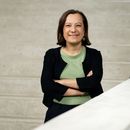Cultural Collisions
Cultural Collisions brings together different disciplines and different people, diversity takes place at all levels, but the goal is the big picture.
The internationally tested, interdisciplinary art and science education format gives pupils access to the world of science and technology. They approach complex topics through artistic exploration. This promotes early inspiration for their later choice of studies.
The diversity of technology and the associated job profiles, which are constantly changing with great dynamism, are often difficult for young people to grasp. Outdated role models and persistent stereotypes still deter young women.
Cultural Collisions enables a new approach through a creative approach to directly experience the perspective of "technician as a profession". In addition to highlighting career options, this also helps to counteract the lack of young people in STEM professions.
Challenges
Society faces the following challenges:
- shortage of young people in STEM professions
- Outdated role models and stereotypes
- low number of female students in technical and scientific studies
We counteract these with the Cultural Collisions project by inspiring students to study STEM subjects and motivating them to break through stereotypes. In this way, we improve the image of technical professions and master the challenges of the future with suitable skilled personnel. The artistic and creative engagement with scientific topics creates interdisciplinary competences that are urgently needed in almost all fields in the 21st century.
After activation, data may be transmitted to third parties. Data protection declaration., opens in new window
Cultural Collisions!
Target group
Aimed at teachers and their classes with pupils between 12 and 14 years of age.
Focus on climate change
The content focuses on climate change, its challenges, technical solutions and creative ways of adapting.
The main topics of the previous cycles were as follows:
- Cities/buildings (2022/23)
- Energy (2023/24)
- Mobility (2024/25)
The focus topic for the 2025/26 cycle is the circular economy.
Sponsors and donors
We would like to thank our sponsors and donors who make such a project possible.
Initiator Michael Hoch
Michael Hoch, born in Vienna, created several art objects while studying at the Vienna University of Technology and the University of Vienna. After completing his doctorate, he worked at CERN and for the Austrian Academy of Sciences, while continuing to pursue his artistic endeavours.
Over the past 10 years, Hoch has initiated, planned and/or led numerous international science communication projects. In 2017, he received the ‘Science Communication’ award from the EPH European Physical Society for his specialisation in ‘creating an interdisciplinary science and art dialogue based on global networking of experts’. In recent years, he has implemented educational projects in various countries, which have received multiple international recognition and awards.
Cooperation partners
The Universität für angewandte Kunst, opens an external URL in a new window enriches the project with an artistic and creative perspective and completes the skills required for the implementation of the inspirational exhibition.
With the mumok – Museum moderner Kunst Stiftung Ludwig Wien, opens an external URL in a new window and the Technisches Museum Wien, opens an external URL in a new window, we have experts in art and cultural education with many years of experience on board.
Future Learning Lab Vienna supports the teachers in the Cultural Collisions project through training and further education in the laboratories of the Competence Centre for Learning Technology and Innovation at the Pädagogische Hochschule Wien, opens an external URL in a new window.
We accompany the projects by developing didactic scenarios together with the participating teachers within the framework of our in-service training events, which enable a deepening and broadening of the students' project work in line with the curriculums in everyday school life.
Background image: © brainpencil – stock.adobe.com, Lettering: TinyDoz – stock.adobe.com
